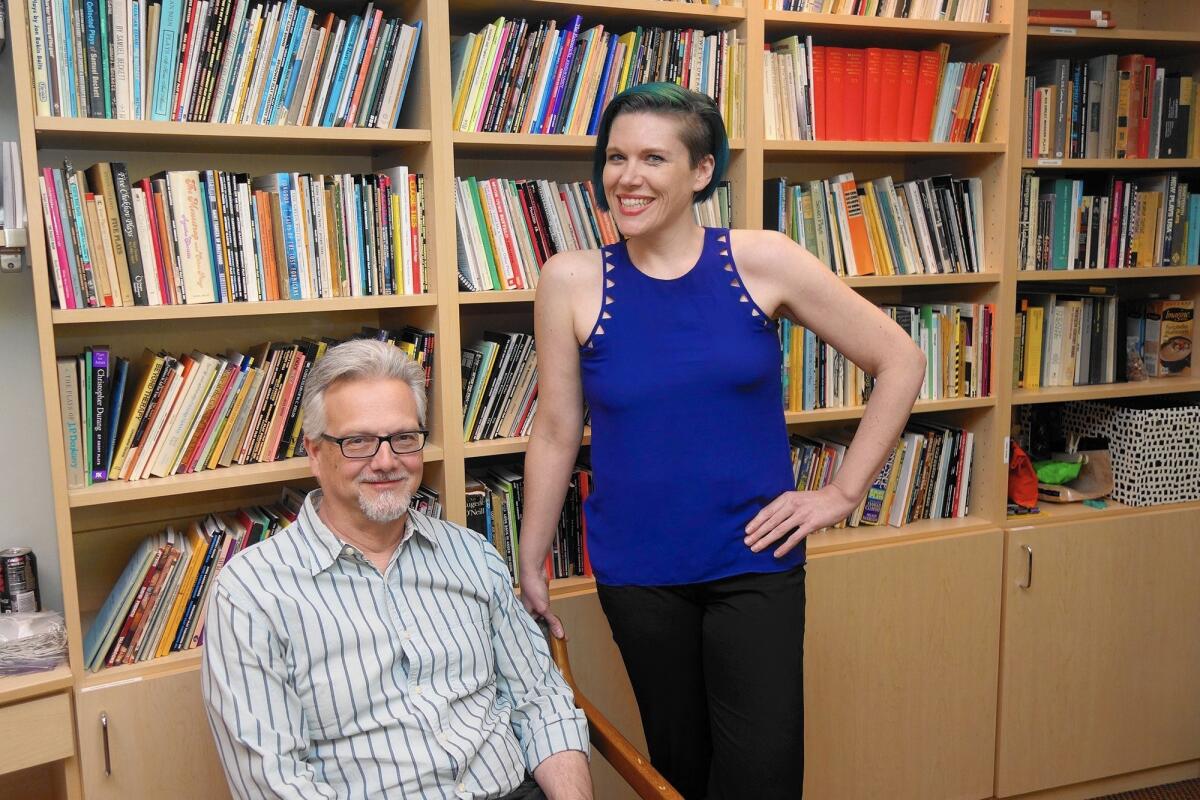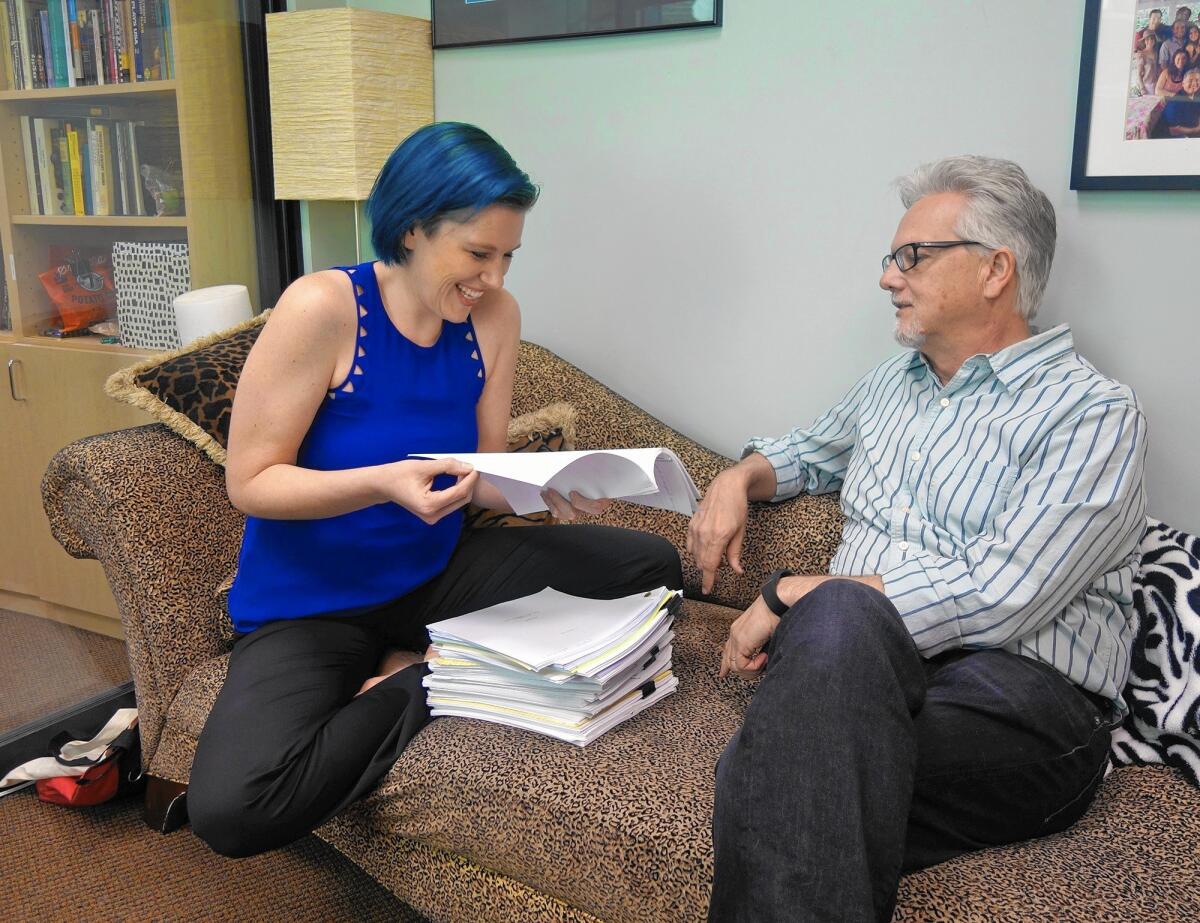Long before a play reaches the stage ...

- Share via
John Glore didn’t know if the play was going to work.
As South Coast Repertory’s associate artistic director, Glore reads hundreds of scripts each year, deciding, among other factors, whether the narrative would be fit for the stage.
So when he read a script that tackled dark issues like gun violence, mental health, racism and terrorism, he had some trepidation before ultimately suggesting that the work become a production.
But he still sent the script for a run-through before the repertory’s founders and directors.
He held his breath as the team made a decision.
They accepted it.
“It was a kind of magic,” Glore said. “I think it proved that it isn’t easy subject material, but it’s a gripping play.”
That latest work is acclaimed playwright Julia Cho’s “Office Hour,” which stars Sandra Oh and is making its world premiere until the end of April at South Coast Repertory.
For three days, the drama will be presented during the Costa Mesa theater’s Pacific Playwrights Festival, from April 22 to 24.

The 19th annual festival is presenting seven new plays in staged readings and full productions over three days, including Cho’s world premiere and works by accomplished playwrights Eliza Clark and Noah Haidle.
It’s a gathering place for writers and theater professionals to connect and share ideas that promote the latest in playwrighting.
But long before actors begin memorizing lines, costume designers create clothes and stage managers schedule rehearsals, the script must be vetted through a screening process.
It’s up to Glore and literary director Kimberly Colburn to ascertain a script’s strengths and weaknesses, comment on the overall effectiveness of the narrative and consider its viability as a production.
If the script seems to be a good fit, it’s sent to the repertory’s artistic directors and founders to make the final call.
Glore and Colburn, who are the Pacific Playwrights Festival co-directors, have a team of readers to help pore through 300 to 500 scripts a year.
“You have to read the bad with the good, because it could be the best play you’ve ever read,” Glore said.
The evaluation process is a communal one, Colburn said, particularly when there is a difference of opinion about a play. Colburn and fellow readers will make “passionate pleas” during a disagreement, causing the rest of the team to reevaluate initial judgments.
Once the 10 to 20 plays are selected as possibilities for future productions — to cover a year’s worth of entertainment at the repertory, not just the Pacific Playwrights Festival — the team pitches them over lunch, and then the two founding artistic directors, David Emmes and Martin Benson, and top executives including artistic director Marc Masterson discuss the pros and cons of each script.
They consider the aesthetics of a potential play and seek to have diversity each season, a balance of comedic and serious offerings, for instance.
After the plays are chosen, the team contacts the writers, prepared to give feedback that usually comes in forms of questions. If a part wasn’t entirely clear, they’ll ask for the writer to explore the theme further or build on a character’s persona.
The theater offers workshops and retreats so writers can expand on the feedback.
“The play belongs to the playwright,” Colburn said. “We do everything we can to help the writer, and sometimes that’s a long venture.”
The most challenging aspect of the work?
“Getting in touch with the writers who didn’t make the cut,” Colburn said as she squinted her eyes, “that’s never fun.”
Since the festival’s beginnings, it has introduced over 100 plays nationwide, including the world premiers of Qui Nguyen’s “Vietgone,” Melissa Ross’ “Of Good Stock” and Cho’s “The Language Archive.”
The repertory is currently considering material for the 20th annual Pacific Playwrights Festival even though it’s a year away, drawing from commissioned work, projects nominated by other theaters and scripts submitted for production consideration.
“I love that it changes all the time, that you don’t know what it’s going to be about,” Colburn said. “Working with all these playwrights is very gratifying.”
And to any budding playwright, page count does not necessarily dictate the quality of the content, Glore said.
“The first thing I will do is flip to the back to see how many pages it is,” Glore said with a grin. “If it’s 150, I’ll think, ‘Oh, really?’”
He’ll budget more time and pick a place where he can sit patiently and devote his attention to the work.
For Glore and Colburn, reading has always been a pleasure.
When not reading a script, they’ll turn pages of books they are reading on the side so they can follow American culture, current themes and topics.
“My family would tell me to put my book away at Thanksgiving,” Colburn said, with a laugh. “I love what I do and I enjoy the variety.”
*
IF YOU GO
What: Pacific Playwrights Festival
When: April 22 to 24
Where: South Coast Repertory, 655 Town Center Drive, Costa Mesa
Cost: Staged readings, $17; world premiere productions, $30 to $77
Information: (714) 708-5555 or visit scr.org
